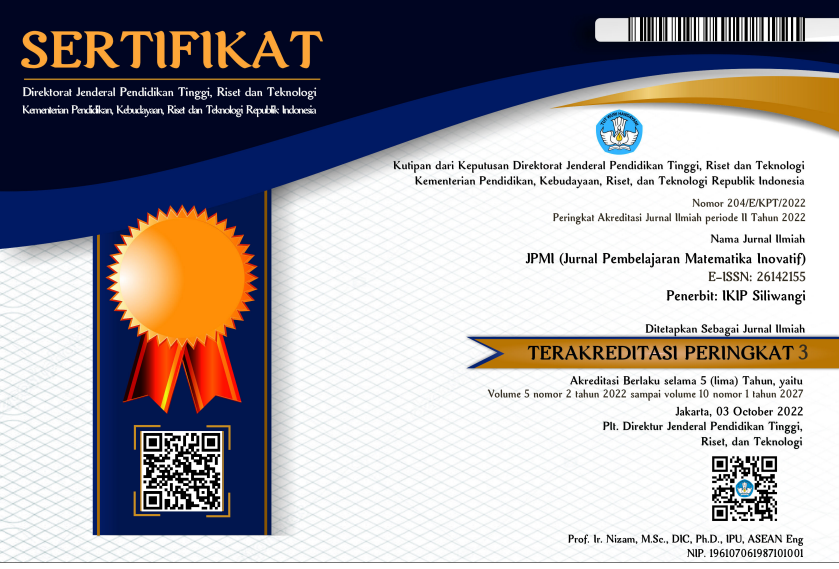Penerapan model problem based learning berbantuan media audiovisual dalam meningkatkan kemampuan komunikasi matematis siswa kelas VII
DOI:
https://doi.org/10.22460/jpmi.v7i4.24694Keywords:
Mathematical communication skills, Problem Based Learning, AudiovisualAbstract
This research was motivated by the low mathematical communication skills of high school students, this research was carried out at SMP Dharma Kartini in grade VII as many students. The instrument used was a mathematical communication ability description test. The purpose of this research is to improve students' mathematical communication skills and the achievement of students' learning goals using the Problem Based Learning (PBL) model assisted by audiovisual media. The data from the study were processed using 2 independent samples using the normality test and the Monte Carlo test. The results of the analysis showed that grade VII junior high school students who used the Problem Based Learning (PBL) model with the help of audiovisual media got a better increase in mathematical communication skills compared to students who used the conventional learning model. Furthermore, students who get an improvement in learning using the Problem Based Learning (PBL) model assisted by audiovisual media also experience achievement in learning objectives.
References
Afifah, E. P., Wahyudi, W., & Setiawan, Y. (2019). Efektivitas problem based learning dan problem solving terhadap kemampuan berpikir kritis siswa selas V dalam pembelajaran matematika. MUST: Journal of Mathematics Education, Science and Technology, 4(1), 95. https://doi.org/10.30651/must.v4i1.2822
Afsari, S., Safitri, I., Harahap, S. K., & Munthe, L. S. (2021). Systematic literature review: efektivitas pendekatan pendidikan matematika realistik pada pembelajaran matematika. Indonesian Journal of Intellectual Publication, 1(3), 189–197. https://doi.org/10.51577/ijipublication.v1i3.117
Anggraena, Y., Ginanto, D., Felicia, N., Andiarti, A., Herutami, I., Alhapip, L., Iswoyo, S., Hartini, Y., & Mahardika, R. L. (2022). Panduan pembelajaran dan asesmen. In Badan Standar, Kurikulum, Dan Asesmen Pendidikan Kementerian Pendidikan, Kebudayaan, Riset, Dan Teknologi Republik Indonesia.
Ekawati, N., Dantes, N., & Marhaeni, A. (2019). Pengaruh model project based learning berbasis 4C terhadap kemandirian belajar dan kemampuan membaca pemahaman pada siswa kelas IV SD gugus III kecamatan kediri kabupaten tabanan. Pendasi: Jurnal Pendidikan Dasar Indonesia, 3(1), 41–51.
Hakim, F., Fitriani, N., & Nurfauziah, P. (2024). Peningkatan kemampuan komunikasi matematis siswa kelas VIII di MTsN 04 KBB menggunakan model pembelajaran discovery learning pada materi lingkaran. Jurnal Pembelajaran Matematika Inovatif, 7(2), 435–444. https://doi.org/10.22460/jpmi.v7i2.22038
Hasanah, U., Sarjono, S., & Hariyadi, A. (2021). Pengaruh model problem based learning terhadap prestasi belajar IPS SMP taruna kedung adem. Aksara: Jurnal Ilmu Pendidikan Nonformal, 7(1), 43. https://doi.org/10.37905/aksara.7.1.43-52.2021
Hidayat, A. (2018). Pengaruh model pembelajaran berbasis masalah dengan pendekatan pemecahan masalah terhadap kemampuan komunikasi matematis siswa SMP negeri 1 rumbio jaya. Jurnal Cendekia : Jurnal Pendidikan Matematika, 1(1), 23–40. https://doi.org/10.31004/cendekia.v2i1.30
Janah, F. N. M., Sulasmono, B. S., & Setyaningtyas, E. W. (2019). Peningkatan hasil belajar matematika melalui model problem based learning berbantuan media video siswa kelas IV sekolah dasar. Jurnal Karya Pendidikan Dasar, 7(1), 63–73. https://doi.org/https://doi.org/10.20961/jpd.v7i1.29002
Juhairiah, J. (2023). Meningkatkan kemampuan guru dalam menetapkan kriteria ketercapaian tujuan pembelajaran (KKTP) melalui workshop intern sekolah di SDN karang bayat 01 sumber baru. Jurnal Simki Postgraduate, 2(3), 190–200.
Jusmiana, A., & Herianto, H. (2020). Pengaruh penggunaan media audio visual terhadap hasil belajar matematika siswa SMP di era pandemi covid-19. Pedagogy: Jurnal Pendidikan Matematika, 5(2), 1–11. https://doi.org/10.30605/pedagogy.v5i2.400
Madhavia, P., Murni, A., & Saragih, S. (2020). Pengaruh model problem based learning terhadap kemampuan komunikasi matematis siswa kelas VII SMP kabupaten kuantan singingi. Jurnal Cendikia : Jurnal Pendidikan Matematika, 4(2), 1239–1245. https://doi.org/10.32938/jpm.v2i1.569
Maesari, C., Marta, R., & Yusnira, Y. (2020). Penerapan model pembelajaran problem solving untuk meningkatkan kemampuan pemecahan masalah matematika siswa sekolah dasar. Journal on Teacher Education, 1(1), 92–102. https://doi.org/10.31004/jote.v1i1.508
Novitasari, R., Anggraito, Y. U., & Ngabekti, S. (2015). Efektivitas model problem based learning berbantuan media audio-visual terhadap motivasi dan hasil belajar siswa pada materi sistem ekskresi. Journal of Biology Education, 4(3), 298–303. https://doi.org/https://doi.org/10.15294/jbe.v4i3.9583
Prasetyo, F., & Kristin, F. (2020). Pengaruh model pembelajaran problem based learning dan model pembelajaran discovery learning terhadap kemampuan berpikir kritis siswa kelas 5 SD. DIDAKTIKA TAUHIDI: Jurnal Pendidikan Guru Sekolah Dasar, 7(1), 13–27. https://doi.org/10.30997/dt.v7i1.2645
Purnamasari, A., & Afriansyah, E. A. (2021). Kemampuan komunikasi matematis siswa SMP pada topik penyajian data di pondok pesantren. Plusminus: Jurnal Pendidikan Matematika, 1(2), 207–222. https://doi.org/10.31980/plusminus.v1i2.1257
Siagian, M. D. (2016). Kemampuan koneksi matematik dalam pembelajaran matematika. MES: Journal of Matematics Education and Science2, 2(1), 58–67.
Sinaga, R. S., & Manik, S. C. (2019). Pengaruh model pembelajaran problem based learning terhadap kemampuan komunikasi matematis siswa kelas VIII SMP negeri 2 salapian kabupaten langkat tahun pelajaran 2018/2019. Jurnal Serunai Ilmu Pendidikan, 5(1), 53–58. https://doi.org/10.37755/sjip.v5i1.154
Syamsir, N. F., & Noviarni. (2018). Peningkatan kemampuan komunikasi matematis : pengembangan lembar kerja siswa berbasis probing-prompting untuk siswa sekolah menengah pertama. Journal Mathematics Learning, 1(2), 171–182.
Wullandari, P., Jaya, W. S., & Noviyana, H. (2021). Pengaruh model pembelajaran teams games tournament berbantu media audio-visual terhadap komunikasi matematika siswa kelas VIII semester ganjil SMP negeri 22 pesawaran tahun pelajaran 2021/2022. Jurnal Ilmiah Mahasiswa Pendidikan Matematika, 3(2), 1–11. https://doi.org/https://www.stkippgribl.ac.id/eskripsi/index.php/matematika/article/view/46
Yampap, U., & Hasyda, S. (2023). Pengaruh penerapan model problem based learning terhadap peningkatan keterampilan berpikir kritis siswa. Jurnal Pendidikan Dasar Flobamorata, 4(1), 437–443. https://doi.org/10.51494/jpdf.v4i1.853
Yanti, A. H. (2017). Penerapan model problem based learning (PBL) terhadap kemampuan komunikasi dan kemampuan pemecahan masalah matematika siswa sekolah menengah pertama lubuklinggau. Jurnal Pendidikan Matematika Raflesia, 2(2), 118–129. http://repositorio.unan.edu.ni/2986/1/5624.pdf%0Ahttp://fiskal.kemenkeu.go.id/ejournal%0Ahttp://dx.doi.org/10.1016/j.cirp.2016.06.001%0Ahttp://dx.doi.org/10.1016/j.powtec.2016.12.055%0Ahttps://doi.org/10.1016/j.ijfatigue.2019.02.006%0Ahttps://doi.org/10.1
Yanti, Yusran, S., & Ino, L. (2019). Pengaruh penggunaan media audiovisual terhadap hasil belajar siswa dalam pembelajaran seni tari tradisional lumense kelas VIII SMP negeri 16 poleang tengah. Pembelajaran Seni Dan Budaya, 4(2), 54–60. https://doi.org/10.33772/jpsb.v4i2.7822
Yuliani, A. (2015). Meningkatkan kemampuan komunikasi matematik pada mahasiswa melalui pendekatan contextual teaching and learning (CTL). Infinity Journal, 4(1), 1–9. https://doi.org/10.22460/infinity.v4i1.66
Downloads
Published
Issue
Section
License

This work is licensed under a Creative Commons Attribution-ShareAlike 4.0 International License.
The author is responsible for acquiring the permission(s) to reproduce any copyrighted figures, tables, data, or text that are being used in the submitted paper. Authors should note that text quotations of more than 250 words from a published or copyrighted work will require grant of permission from the original publisher to reprint. The written permission letter(s) must be submitted together with the manuscript.
















